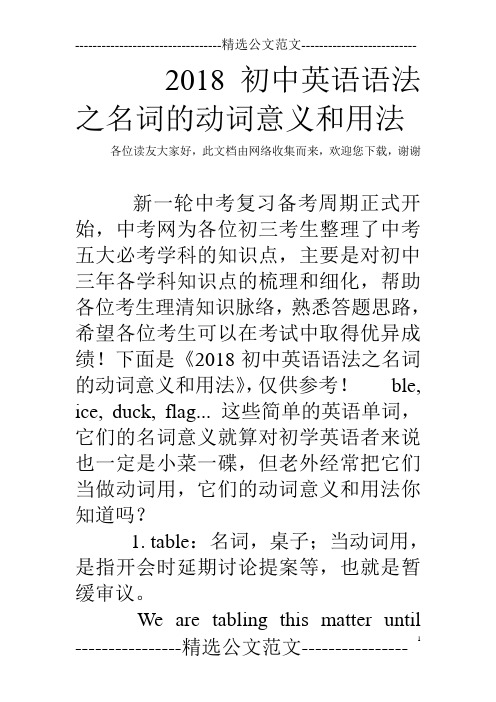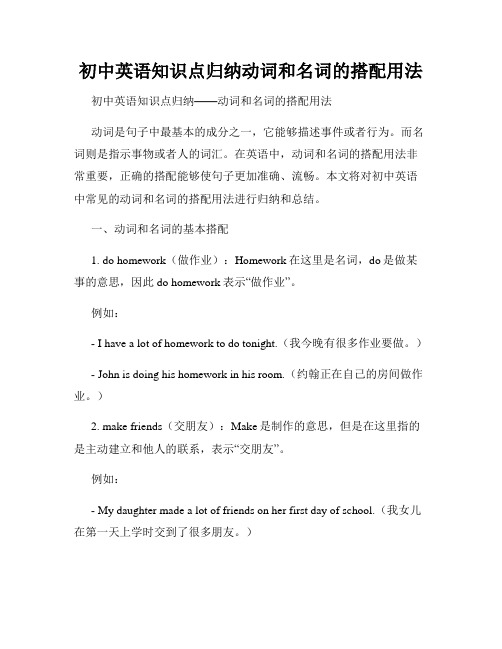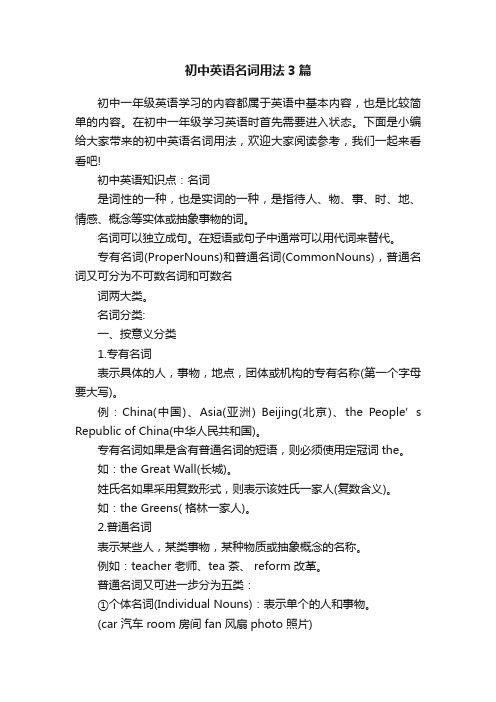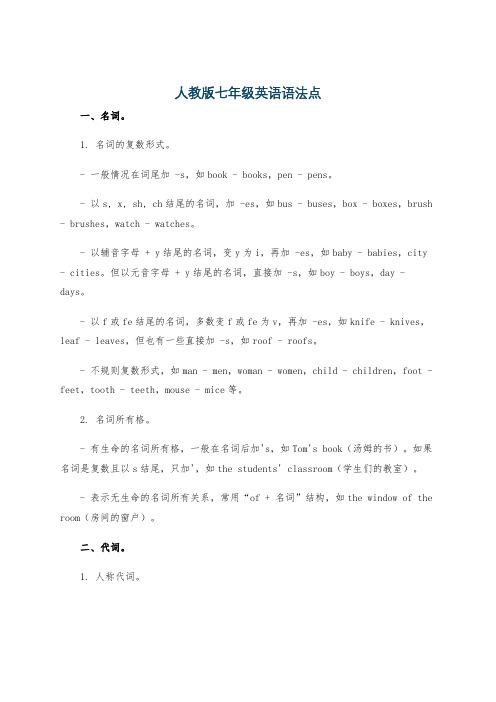人教版初中英语名词的动词意义和用法大全
语法名词和动词的用法

语法名词和动词的用法语法是语言学中的一个重要分支,它研究语言的结构、规则和意义。
而名词和动词是语法中两个基本的词类,它们在句子中起着不可或缺的作用。
本文将探讨名词和动词的用法以及其在句子中的功能。
一、名词的用法名词是用来指代人、事物、地点、抽象概念等具体或抽象的对象的词语。
名词在句子中可以担当主语、宾语、表语、定语等不同的语法成分。
1. 主语:名词作为句子的主语,通常位于句子的开头,用来说明句子的主体是谁或什么。
例如:- 她是一位作家。
(She is a writer.)- 美丽是主观的。
(Beauty is subjective.)2. 宾语:名词作为句子的宾语,接受动作的对象。
例如:- 她喜欢音乐。
(She likes music.)- 我们需要帮助。
(We need help.)3. 表语:名词作为表语,用来说明主语的身份、性质或状态。
例如:- 我的父亲是医生。
(My father is a doctor.)- 她变成了一位律师。
(She became a lawyer.)4. 定语:名词作为定语,修饰其他名词或代词,限定其范围或说明其属性。
例如:- 他是一个优秀的律师。
(He is an excellent lawyer.)- 蓝色的天空很美丽。
(The blue sky is beautiful.)二、动词的用法动词是表示动作、状态或存在的词语,它在句子中通常起着谓语的作用。
1. 行为动词:表示人或事物的动作或行为。
例如:- 我们每天锻炼身体。
(We exercise every day.)- 他在公园里跑步。
(He is running in the park.)2. 状态动词:表示人或事物的状态或状态变化。
例如:- 这朵花开了。
(The flower has bloomed.)- 我感到很累。
(I feel tired.)3. 连系动词:连接主语和表语,用来说明主语的状态或性质。
2018初中英语语法之名词的动词意义和用法

2018初中英语语法之名词的动词意义和用法各位读友大家好,此文档由网络收集而来,欢迎您下载,谢谢新一轮中考复习备考周期正式开始,中考网为各位初三考生整理了中考五大必考学科的知识点,主要是对初中三年各学科知识点的梳理和细化,帮助各位考生理清知识脉络,熟悉答题思路,希望各位考生可以在考试中取得优异成绩!下面是《2018初中英语语法之名词的动词意义和用法》,仅供参考!ble, ice, duck, flag... 这些简单的英语单词,它们的名词意义就算对初学英语者来说也一定是小菜一碟,但老外经常把它们当做动词用,它们的动词意义和用法你知道吗?1. table:名词,桌子;当动词用,是指开会时延期讨论提案等,也就是暂缓审议。
We are tabling this matter untilfurther notice.2. pride:名词,荣誉;当动词用,是指感到得意或自豪。
例如:We prided ourselves on our good work.I have long prided myself on being a good teacher.注意:to pride oneself on和to be proud of 或to take pride in 意思相近,只是用法和后面所跟的介词不同而已。
例如:They take great pride in her daughter who is now a famous scientist.I am very proud of being a Chinese.3. carpet:名词,地毯;当动词用,是覆盖的意思。
例如:The flower girls carpeted the floor with rose petals before the bride’s entrance.During the winter time my roof is carpeted with white snow.4. floor:名词,地板;当动词用,是踩足汽车的油门,加速开车或使人惊讶。
初中英语知识点归纳动名词的用法

初中英语知识点归纳动名词的用法动名词是英语中的一个重要语法形式,它在句子中可以充当名词的作用。
动名词的构成方式是在动词的原形基础上加上-ing。
本文将就初中英语中动名词的用法进行归纳,帮助同学们更好地理解和运用。
一、作主语1. 表示一种普遍的、持久的或重复性的行为或状态。
例句:Swimming is good for health.(游泳对健康有益。
)2. 表示一种爱好、兴趣或需要。
例句:Reading books is my favorite hobby.(读书是我最喜欢的爱好。
)3. 表示一种抽象的行为或观念。
例句:Lying is not acceptable in any situation.(撒谎在任何情况下都是不可接受的。
)二、作宾语1. 某些动词后接动名词作宾语,表示持续的或习惯性的行为。
例句:I enjoy dancing.(我喜欢跳舞。
)2. 某些动词后接动名词作宾语,表示停止或开始行为。
例句:I stopped smoking last year.(我去年戒烟了。
)3. 某些动词后接动名词作宾语,表示喜欢或讨厌的行为。
例句:She hates cooking.(她讨厌做饭。
)三、作表语动名词作表语通常用来表示现在或过去某种特定的行为、活动或状态。
例句:Her favorite activity is swimming.(她最喜欢的活动是游泳。
)四、作宾补某些动词后接动名词作宾补,表示完成或实现动作。
例句:I saw him running in the park.(我看到他在公园里跑步。
)五、作介词宾语动名词可以作为介词的宾语,用来表示目的、原因、方法等。
例句:She always studies English by listening and speaking.(她总是通过听和说来学习英语。
)六、作定语动名词可以作为名词的定语,用来修饰名词。
例句:I bought a running shoes.(我买了一双跑步鞋。
初中英语知识点归纳动词和名词的搭配用法

初中英语知识点归纳动词和名词的搭配用法初中英语知识点归纳——动词和名词的搭配用法动词是句子中最基本的成分之一,它能够描述事件或者行为。
而名词则是指示事物或者人的词汇。
在英语中,动词和名词的搭配用法非常重要,正确的搭配能够使句子更加准确、流畅。
本文将对初中英语中常见的动词和名词的搭配用法进行归纳和总结。
一、动词和名词的基本搭配1. do homework(做作业):Homework在这里是名词,do是做某事的意思,因此do homework表示“做作业”。
例如:- I have a lot of homework to do tonight.(我今晚有很多作业要做。
)- John is doing his homework in his room.(约翰正在自己的房间做作业。
)2. make friends(交朋友):Make是制作的意思,但是在这里指的是主动建立和他人的联系,表示“交朋友”。
例如:- My daughter made a lot of friends on her first day of school.(我女儿在第一天上学时交到了很多朋友。
)- We should make new friends wherever we go.(无论我们去哪里,都应该结交新朋友。
)3. take a shower(洗澡):Take在这里表示进行动作,与“洗澡”这个名词搭配使用,表示“洗澡”。
例如:- It's important to take a shower every day to keep clean.(每天洗澡保持清洁是很重要的。
)- After playing sports, I always take a shower to refresh myself.(运动之后,我总是洗个澡让自己恢复精神。
)二、常见动词和名词的搭配1. do housework(做家务):Housework在这里是名词,表示家庭中的各种家务活动,do要与它搭配使用,表示“做家务”。
初中英语名词用法3篇

初中英语名词用法3篇初中一年级英语学习的内容都属于英语中基本内容,也是比较简单的内容。
在初中一年级学习英语时首先需要进入状态。
下面是小编给大家带来的初中英语名词用法,欢迎大家阅读参考,我们一起来看看吧!初中英语知识点:名词是词性的一种,也是实词的一种,是指待人、物、事、时、地、情感、概念等实体或抽象事物的词。
名词可以独立成句。
在短语或句子中通常可以用代词来替代。
专有名词(ProperNouns)和普通名词(CommonNouns),普通名词又可分为不可数名词和可数名词两大类。
名词分类:一、按意义分类1.专有名词表示具体的人,事物,地点,团体或机构的专有名称(第一个字母要大写)。
例:China(中国)、Asia(亚洲) Beijing(北京)、the People’s Republic of China(中华人民共和国)。
专有名词如果是含有普通名词的短语,则必须使用定冠词the。
如:the Great Wall(长城)。
姓氏名如果采用复数形式,则表示该姓氏一家人(复数含义)。
如:the Greens( 格林一家人)。
2.普通名词表示某些人,某类事物,某种物质或抽象概念的名称。
例如:teacher 老师、tea 茶、 reform 改革。
普通名词又可进一步分为五类:①个体名词(Individual Nouns):表示单个的人和事物。
(car 汽车 room 房间 fan 风扇photo 照片)②集体名词(Collective Nouns):表示一群人或一些事物的名称。
( people 人们 family 家庭 army 军队 government政府 group 集团 )③复合名词:两个或两个以上名词连在一起构成的名词(boy-friend男友 passer-by过路人 brother-in-law内兄)④物质名词(Material Nouns):表示物质或不具备确定形状和大小的个体的物质。
( fire 火 steel 钢 air 空气 water 水 milk牛奶 )⑤抽象名词(Abstract Nouns):表示动作,状态,品质或其他抽象概念。
人教版七年级英语语法点

人教版七年级英语语法点一、名词。
1. 名词的复数形式。
- 一般情况在词尾加 -s,如book - books,pen - pens。
- 以s, x, sh, ch结尾的名词,加 -es,如bus - buses,box - boxes,brush - brushes,watch - watches。
- 以辅音字母 + y结尾的名词,变y为i,再加 -es,如baby - babies,city - cities。
但以元音字母 + y结尾的名词,直接加 -s,如boy - boys,day - days。
- 以f或fe结尾的名词,多数变f或fe为v,再加 -es,如knife - knives,leaf - leaves,但也有一些直接加 -s,如roof - roofs。
- 不规则复数形式,如man - men,woman - women,child - children,foot - feet,tooth - teeth,mouse - mice等。
2. 名词所有格。
- 有生命的名词所有格,一般在名词后加's,如Tom's book(汤姆的书)。
如果名词是复数且以s结尾,只加',如the students' classroom(学生们的教室)。
- 表示无生命的名词所有关系,常用“of + 名词”结构,如the window of the room(房间的窗户)。
二、代词。
1. 人称代词。
- 主格:I(我),you(你/你们),he(他),she(她),it(它),we(我们),they(他们/她们/它们)。
主格在句中作主语,如I like English.(我喜欢英语。
)- 宾格:me(我),you(你/你们),him(他),her(她),it(它),us (我们),them(他们/她们/它们)。
宾格在句中作宾语,如He helps me.(他帮助我。
)2. 物主代词。
初中英语语法专题名词与动词
初中英语语法专题名词名词一、英语名词可分专有名词和普通名词两大类:1、专有名词是个别的人、地、物、团体、机构等的专用名称。
专有名词中实词的第一个字母要大写。
如:Beijing, Tom, the People’s Republic of China(中华人民共和国)专有名词如果是含有普通名词的短语,则必须使用定冠词the。
如:the Great Wall(长城)姓氏名如果采用复数形式,则表示该姓氏一家人(复数含义),如:the Greens( 格林一家人)。
2、普通名词是许多人或事物的共有名称。
如:pupil, family, man, foot.普通名词又分为可数名词和不可数名词。
▲可数名词是可以用简单的数词进行计数的名词,如: box, child, orange;▲不可数名词是不可以用简单的数词进行计数的名词。
如:water, news, oil, population, information .二、英语可数名词的单复数:英语可数名词有单数和复数两种形式。
1、名词由单数变复数的基本方法如下:①在单数名词词尾加s。
如:map → maps,boy→ boys,horse→ horses, table→ tables.②s,o,x ,sh,ch结尾的词加es.如:class→classes, box→boxes,hero→heroes, dish→dishes, bench→benches.[注]:少数以o结尾的词,变复数时只加s。
如:photo→photos,piano→pianos.③以辅音字母加y结尾的名词,变y为i,再加es。
如:family→families, city→cities, party→parties.④以f或fe结尾的名词,变f或fe为v,再加es。
如:shelf→shelves, wolf→wolves, life→lives, knife→knives.2、不规则变化:man→men, woman→women, sheep→sheep,tooth→teeth, fish→fish, child→children, ox→oxen, goose→geese不可数名词一般没有复数形式,说明其数量时,要用有关计量名词。
人教版七年级下册英语知识点归纳
人教版七年级下册英语知识点归纳
一、词汇知识点
1. 名词:表示人、事物或物体的名称。
2. 动词:表示动作或状态的词语。
3. 形容词:描述人或事物的特征或性质。
4. 副词:修饰动词、形容词或其他副词,表示时间、地点、程
度等。
5. 介词:连接名词或代词与其他词性的词语,表示位置、时间、原因等。
6. 数词:表示数量或顺序的词语。
7. 代词:替代名词的词语,例如人称代词、指示代词等。
8. 冠词:放在名词前面,用来限定名词的词语。
二、语法知识点
1. 现在进行时:表示现在正在进行的动作或状态。
2. 一般现在时:表示经常、反复或总是发生的动作或状态。
3. 一般过去时:表示过去某个时间发生的动作或状态。
4. 一般将来时:表示将来要发生的动作或状态。
5. 祈使句:表示请求、命令、建议等的句子类型。
6. 疑问句:表示疑问的句子类型。
7. 定冠词与不定冠词的用法:表示特指或泛指的名词前需要使用不同的冠词。
三、阅读理解技巧
1. 细节理解:根据文章中的具体信息来回答问题。
2. 推理判断:根据已有信息进行推理,得出结论。
3. 主题概括:对文章的主要内容进行概括。
4. 上下文猜词:根据上下文的语境猜测单词的意思。
5. 标题选取:选择合适的标题来概括文章的内容。
以上是人教版七年级下册英语知识点的简要归纳,希望对你有所帮助!。
语法基础了解名词和动词的用法
语法基础了解名词和动词的用法在英语语法中,名词和动词是最基本的词类,它们在句子中承担着不同的语法功能。
本文将详细介绍名词和动词的基本用法以及在句子中的不同作用。
一、名词的基本用法名词是指用来表示人、事物、地点、抽象概念等具体或抽象事物的词类。
名词可以用来表示主语、宾语、表语、定语以及它所属关系等。
1. 主语:名词可以作为句子的主语,用来说明句子主要的行为对象或说话的对象。
例如:- Dogs are loyal animals.(狗是忠诚的动物。
)- My sister is a doctor.(我姐姐是一名医生。
)2. 宾语:名词可以作为动词的宾语,表示动作的承受者或所影响的对象。
例如:- I bought a new car.(我买了一辆新车。
)- He loves playing basketball.(他喜欢打篮球。
)3. 表语:名词可以作为系动词的表语,表示主语的身份、特征或状态。
例如:- She is a student.(她是一名学生。
)- The movie was a great success.(这部电影取得了巨大的成功。
)4. 定语:名词可以用来修饰其他名词,起到描述、限制和区分的作用。
例如:- I have a red car.(我有一辆红色的车。
)- The book on the table is mine.(桌子上的书是我的。
)5. 所属关系:名词可以用来表示所属关系,通过添加's或'后缀来表示名词的所有格形式。
例如:- Tom's hat(汤姆的帽子)- The dog's tail(狗的尾巴)二、动词的基本用法动词是指用来表示行为、状态或存在的词类,它是句子的核心和谓语成分。
1. 表示行为:动词可以用来表示人或事物进行的行为。
例如:- She runs every morning.(她每天早上跑步。
)- They are playing soccer in the park.(他们在公园踢足球。
名词和动词知识点总结
名词和动词知识点总结一、名词的定义和分类名词是指代人、事物、地方、感情、抽象概念等的词语,它是构成句子的主体部分之一。
名词可以根据其属性和性质分为以下两类:1.具体名词:指代具体的人、事物、地方等,如:apple(苹果)、table(桌子)、Beijing (北京)等。
2.抽象名词:指代抽象的概念、感情等,如:love(爱情)、happiness(幸福)、freedom(自由)等。
二、名词的用法名词可以在句子中充当主语、宾语、表语等不同的成分,同时还有很多固定的搭配和用法。
以下是名词的一些常见用法:1.作主语:名词可以在句子中充当主语,说明动作的执行者或发生的事情,如:The cat is sleeping(猫在睡觉)。
2.作宾语:名词可以在句子中充当宾语,接受动作的影响,如:I like apples(我喜欢苹果)。
3.作表语:名词可以在句子中充当表语,用来说明主语的属性或身份,如:He is a teacher (他是一名老师)。
4.作定语:名词可以在句子中充当定语,修饰其他名词,如:the book store(书店)。
三、名词的性质名词具有以下一些性质:1.可数性:名词可以分为可数名词和不可数名词。
可数名词可以单数和复数,可以用数目来计数,如:book(书)→books(书籍);不可数名词没有复数形式,不能用数目来计数,如:water(水)、money(钱)。
2.所有格:名词可以通过在词尾加上's来表示所有格,用来表示名词所属的关系,如:Tom's bag(汤姆的包)。
四、动词的定义和分类动词是表示动作、状态或变化的词语,它在句子中可以表示主语的动作或状态。
动词可以根据其功能和性质分为以下几类:1.及物动词:需要接一个宾语才能构成完整的意思,如:eat(吃)、write(写)。
2.不及物动词:不需要接宾语就可以构成完整的意思,如:run(跑)、sleep(睡觉)。
3.系动词:用来连接主语和表语,表示主语所处的状态或性质,如:be(是)、seem(似乎)。
- 1、下载文档前请自行甄别文档内容的完整性,平台不提供额外的编辑、内容补充、找答案等附加服务。
- 2、"仅部分预览"的文档,不可在线预览部分如存在完整性等问题,可反馈申请退款(可完整预览的文档不适用该条件!)。
- 3、如文档侵犯您的权益,请联系客服反馈,我们会尽快为您处理(人工客服工作时间:9:00-18:30)。
名词的动词意义和用法大全ble, ice, duck, flag... 这些简单的英语单词,它们的名词意义就算对初学英语者来说也一定是小菜一碟,但老外经常把它们当做动词用,它们的动词意义和用法你知道吗?1. table:名词,桌子;当动词用,是指开会时延期讨论提案等,也就是暂缓审议。
(to postpone discussion of a bill or suggestion until future time); 例如:They tabled the motion at the meeting.I made the motion and he seconded it.(我提案,他同意。
) (second 这里是动词,意思是赞成;to second the motion 也就是附议)We are tabling this matter until further notice.(我们延期讨论这件事,以后再说。
)2. pride:名词,荣誉;当动词用,是指感到得意或自豪。
(to take pride in something)例如:We prided ourselves on our good work. (我们为自己工作的表现而自豪。
)I have long prided myself on being a good teacher. (我一向以身为一名称职的老师師而自豪。
)注意:to pride oneself on和to be proud of 或to take pride in 意思相近,只是用法和后面所跟的介词不同而已。
例如:They take great pride in her daughter who is now a famous scientist.I am very proud of being a Chinese.3. carpet:名词,地毯;当动词用,是覆盖的意思。
(to cover something) 例如:The flower girls carpeted the floor with rose petals before the bride's entrance. (新娘进来前,花童将玫瑰花瓣撒满了地板。
)During the winter time my roof is carpeted with white snow. (冬天时我家的屋顶盖满了白雪。
)4. floor:名词,地板;当动词用,是踩足汽车的油门,加速开车或使人惊讶。
(to press accelerator of a car to the floor in order to speed up; or to astonish someone) 例如:As soon as I saw his gun, I floored my car. (我一见到他有枪,立即踩足油门加速开车。
) When you see a police car, don't floor it. (当你看到警车时,別开快车。
)The news really floored me; I hadn't been expecting it at all. (这个消息真使我吃惊地不知所措,这完全出乎我地意料。
)5. top:名词,顶端;做动词用,是做得更好,或高过某人。
(to do something better or to be taller than someone) 例如:If he had tried harder, he could have topped his class. (假如他以前用功些,他会在班里(成绩)名列前茅的。
)The tax-cut issue will top today's agenda. (减税问题将是今天的主要议题。
)Mr. Lin tops me by three inches. (林先生比我高三吋)6. flag:名词,旗帜;当动词用,是指打旗号或做手势来传达讯息。
(to give signal for communication) 例如:When my car broke down, I flagged a police car. (当我的汽车抛锚的时候,我打了个信号招来一辆警车。
)The beach life-guards usually flag one another for communication. (海滨救生员通常用旗号传达讯息。
)7. bridge:名词,桥梁、桥牌;当动词用,是连接或沟通的意思。
(to connect) 例如:The parents are trying to bridge the generation gap with their children. (父母都在设法弥合与儿女的代沟。
)These tax reforms are attempt to bridge the gap between the rich and poor. (这些税收改革旨在弥合贫富之间的差距。
)8. club:名词,俱乐部、高尔夫球棒;当动词用,意思是用棍棒打人。
(to beat someone with a stick) 例如:The security officer should not club any suspect who does not resist arrest. (保安人员对任何没有拒捕的嫌犯都不该用棍棒殴打。
)I saw the police clubbing a suspected robber. (我看到警察用棍棒打了那个抢劫嫌疑犯。
)9. soldier:名词,士兵;当动词用,是指不畏困难,坚持下去。
(to forge ahead no matter what difficulty is) 例如:The Marine Corps usually have to soldier on under the hardest conditions. (海军陆战队通常在最艰难的情況下,仍要勇敢前进。
)He doesn't like the job but he'll solider on until they can find a replacement for him.(他不喜欢这个工作,但他会继续干下去,直到他们找到接替他的人为止。
)10. duck:名词,鸭子;当动词用,是逃避、躲避、回避的意思。
(to try to avoid) 例如:His speech was full of generalizations, and ducked all the real issues.(他的讲话全是泛泛而谈,回避了所有实质性的问题。
)11. chair:名词,椅子、主席(chairperson);当动词用,是担任主席(to be a chairperson)例如:He has chaired a committee on international affairs.(他担任国际事务委员会的主席。
) She will chair the math department next semester. (下学期她将担任数学系主任。
)12. doctor:名词,医生、大夫;当动词用,是指窜改、对……做手脚。
(to change, esp. ina dishonest way) 例如:They were charge with doctoring the election results. (他们因窜改选举结果而受到控告。
) to doctor the number 是做假账的意思,相当于to cook the book, to make something fraudulent or falseHe tried to doctor the number before tax time. (他在报税前设法做假账。
)13. cushion:名词,坐垫;当动词用,是指缓和,缓和或降低对某事的撞击或震动(to soften or decrease impact of something)例如:Powerful shock absorbers cushion our landing. (有效的减缓装置缓解了我们着陆时的冲撞力。
)Nothing can cushion the sorrow of her mother's death. (什么也不能减轻她丧母的悲痛。
)14. cap:名词,便帽;当动词用,是指限额、约束或制止。
(to limit something) 例如:The new law has capped the crabbing season in our area. (新法令限制了该地区捕蟹的时节。
)(即不准随时捕蟹)Our school will cap the white student enrollment to promote its diversity programs. (本校为了促进生源的种族多元性,对白人学生的生源加以了限制。
)15. showcase:名词,陈列柜;当动词用,是指展览或亮相(to highlight)。
例如:She fully showcased her ability in the debate. (她在这场辩论赛中充分展示了自己的才华。
)The real estate company is showcasing many new houses in the newspaper.(该房地产公司在报纸上展示了多款新房型。
)16. grandfather:名词,祖父;当动词用,是指保护(免受限制)或保持现状(to protect or to keep the same status)。
例如:Our current employees will be grandfathered under the existing health insurance.(现有卫生医疗制度为我们的员工提供了保障。
)Everybody would like to grandfather this regulation as it is. (大家都想要保持现有的制度。
) The new staff members can not be grandfathered into the old pension system. (新员工不能享受旧有的养老制度。
)17. corner:名词,角落或壁角;当动词用,是指将某人逼入困境或令人无地自容(to put someone in a bad spot )。
